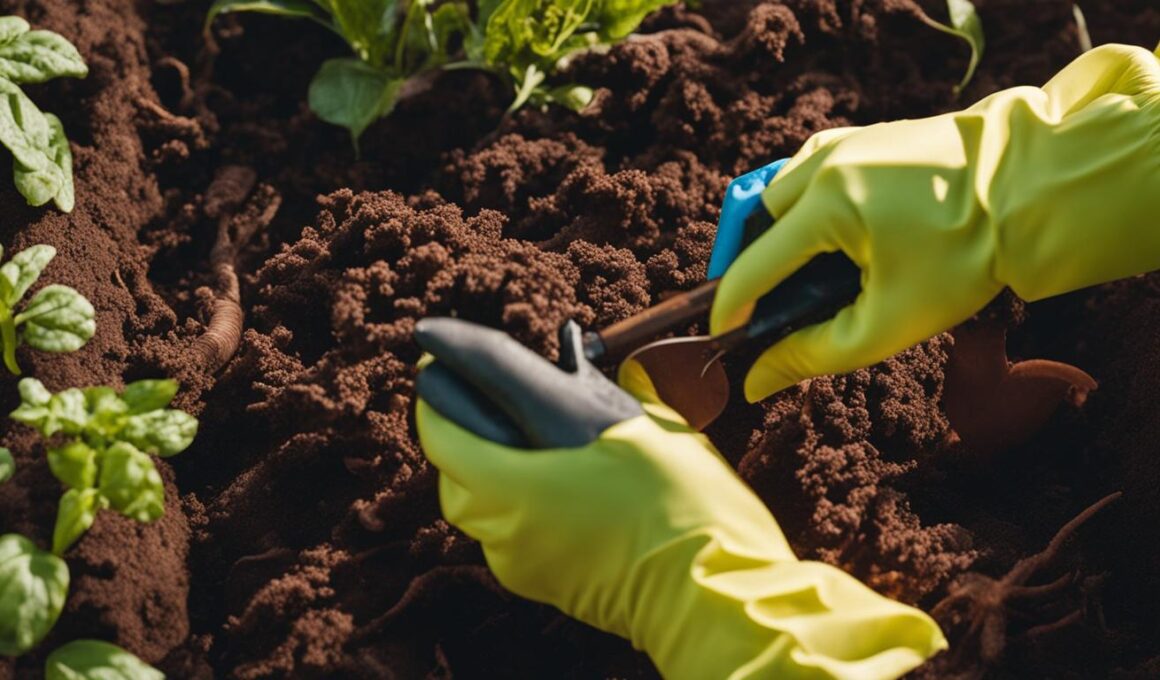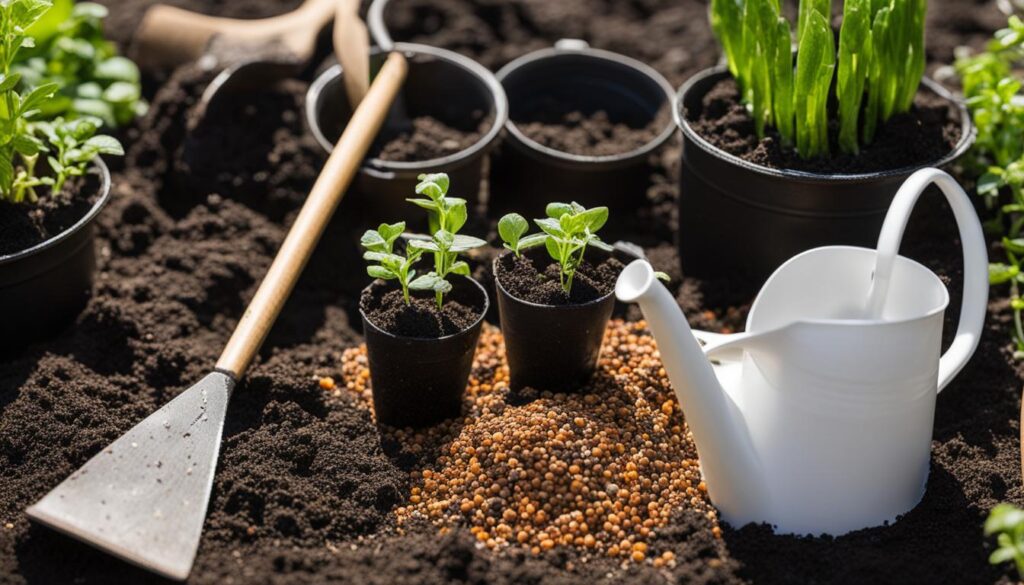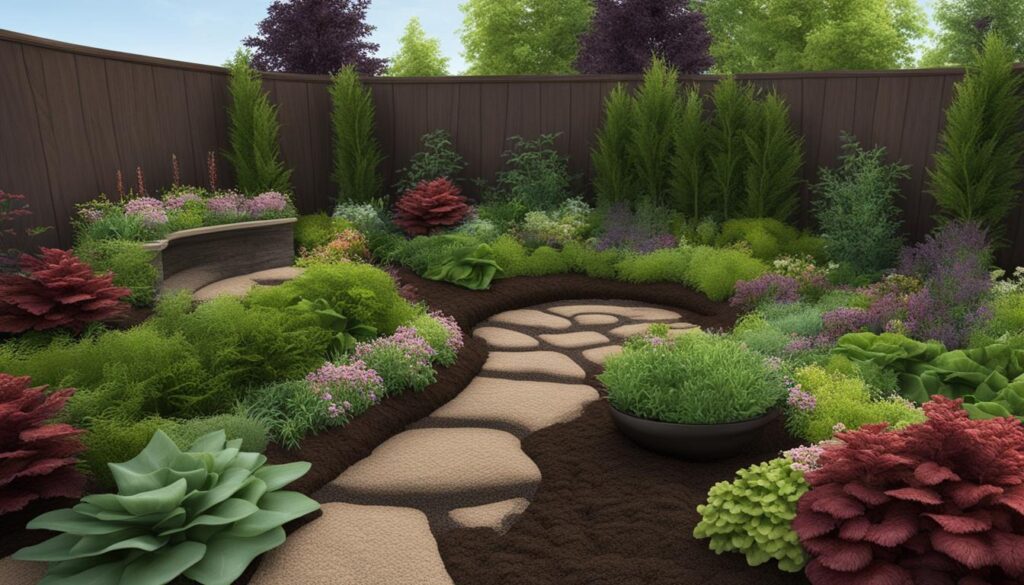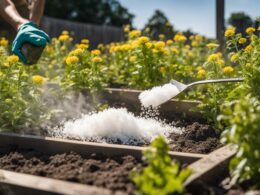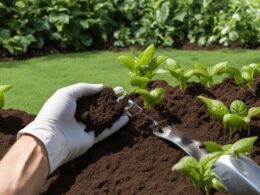Earthworms play a crucial role in maintaining optimal garden health, but they can sometimes become a nuisance. In this article, we will explore five effective methods to control earthworms in your garden soil. These methods include top dressing, amending your soil, using seed starting mix, making worm casting tea, and rejuvenating tired soil. By implementing these strategies, you can strike a balance between the benefits of earthworms and maintaining a healthy garden environment.
Post Summary
- Control earthworm populations to maintain optimal garden health.
- Methods such as top dressing, amending soil, using seed starting mix, making worm casting tea, and rejuvenating tired soil can help control earthworms.
- Experiment with these techniques to find the best approach for your garden.
- Promote optimal plant growth and productivity by balancing earthworm control with maintaining a healthy garden environment.
- Enjoy the rewards of a thriving and well-maintained garden.
Top Dressing: A Simple Way to Fertilize Plants
When it comes to fertilizing plants, top dressing with worm castings is a convenient and effective method. By sprinkling a handful of worm castings on top of the soil around the base of your plants, you can provide them with a rich source of organic nutrients. When it rains or when you water your plants, these nutrients filter down into the soil, promoting healthy growth and optimal plant health.
Unlike other fertilization methods that require measuring and mixing, top dressing with worm castings is hassle-free. It is a suitable technique for gardeners of all skill levels, as it does not require any special equipment or expertise. Simply apply the worm castings evenly around the plants and let nature do the rest.
By utilizing top dressing, you can maximize the benefits of worm castings without disturbing the natural ecosystem of your garden. The nutrients in the castings are slowly released over time, ensuring a steady supply of nourishment for your plants. With this simple and efficient method, you can fertilize your plants while maintaining the overall health and balance of your garden soil.
Benefits of Top Dressing with Worm Castings:
- Provides organic nutrients to plants
- Improves soil structure and fertility
- Enhances microbial activity in the soil
- Promotes healthy plant growth and development
- Reduces the need for chemical fertilizers
By incorporating top dressing into your gardening routine, you can enrich your soil and nourish your plants while minimizing the use of synthetic fertilizers. This sustainable and environmentally friendly practice is a valuable addition to any gardener’s toolkit.
“Top dressing with worm castings is a simple and effective way to provide your plants with the nutrients they need for healthy growth. It’s an eco-friendly alternative to chemical fertilizers that promotes soil health and enhances the overall productivity of your garden.”
– Gardening Expert
Amend Your Soil: Improving Soil Structure and Nutrition
Amending your soil with worm castings is a beneficial practice that improves soil structure and provides essential nutrients for plant growth. When you amend your soil, you create a favorable environment that supports healthy root development and maximizes the benefits of worm castings.
Improving Soil Structure
Worm castings have a unique ability to enhance soil structure. They improve the soil’s water-holding capacity, making it more resilient to drought conditions. Additionally, worm castings help create pore spaces in the soil, allowing for better air circulation and root penetration. These improvements promote optimal nutrient uptake and overall plant health.
Boosting Nutrition
By amending your soil with worm castings, you provide a rich source of nutrients for your plants. Worm castings are packed with essential minerals, organic matter, and beneficial microorganisms. These nutrients are released slowly, ensuring a steady supply of nutrition for your plants throughout their growth cycle.
| Benefits of Amending Soil with Worm Castings |
|---|
| Improves soil structure |
| Enhances water-holding capacity |
| Promotes better air circulation |
| Facilitates root penetration |
| Provides essential nutrients |
| Supports beneficial microorganisms |
To amend your soil with worm castings, mix them with potting soil or garden soil in a ratio of approximately 1 part castings to 4 parts soil. Ensure that the castings are evenly distributed to facilitate maximum contact between the roots of your plants and the worm castings. This will enable the plants to efficiently absorb the nutrients and enjoy the numerous benefits of worm castings.
Amending your soil with worm castings is like giving your plants a nutrient-rich buffet. It not only improves the soil structure but also provides a steady supply of essential nutrients for optimal plant growth. The added bonus of beneficial microorganisms further enhances the health and vitality of your garden. So why settle for average soil when you can supercharge it with the power of worm castings?
Incorporating worm castings into your soil amendment routine is a simple yet effective way to promote soil health and boost the performance of your plants. By harnessing the natural power of earthworms, you can create an environment that fosters robust growth and yields in your garden.
Section 4: Seed Starting Mix: Giving Your Plants a Strong Start
When it comes to getting your plants off to a strong start, incorporating earthworm castings into your seed starting mix is a game-changer. Research has shown that planting seeds in high-quality worm castings can significantly boost germination rates and enhance seedling growth.
Why are earthworm castings so beneficial for seed starting? Worm castings are rich in essential nutrients like nitrogen, phosphorus, and potassium, which are crucial for early plant development. Additionally, worm castings contain beneficial microorganisms that support root growth and help protect seeds from harmful pathogens.
Creating a seed starting mix with earthworm castings is simple. Begin by combining equal parts of high-quality potting soil and worm castings. This ensures that the castings are evenly distributed throughout the mix, providing a nutritious foundation for your seeds. Fill your seed trays or containers with the mixture, plant your seeds at the appropriate depth, and water gently.
As your seeds germinate and grow into seedlings, they’ll benefit from the nutrient-rich environment created by the earthworm castings. The castings release nutrients slowly and steadily, allowing your plants to access them as needed for optimal growth. With a strong start, your seedlings will be better equipped to withstand environmental stressors and develop into healthy, thriving plants.
Seed Starting Mix Tips:
- Use high-quality worm castings to ensure maximum nutrient content.
- Consider using a soil blocker to create uniform seed starting blocks with the mix.
- Label your seed trays or containers with the plant variety and date of planting for easy organization.
- Provide consistent moisture by misting or using a humidity dome to promote germination.
Make Worm Casting Tea: Boosting Plant Nutrition
One effective method to boost plant nutrition and provide a convenient source of liquid fertilizer is by making worm casting tea. Also known as compost tea, this nutrient-rich tonic is created by steeping worm castings in water for 24 hours or more. During the steeping process, beneficial microbes in the castings multiply and release nutrients, creating a potent liquid fertilizer.
Using worm casting tea offers several advantages for plant nutrition. Firstly, it provides a convenient way to deliver nutrients directly to the roots or as a foliar spray. This ensures that plants can easily absorb and utilize the essential vitamins and minerals. Secondly, the tea acts as a protective shield against airborne diseases and infestations, enhancing plant protection and overall health.
“Worm casting tea is a powerful tool for promoting plant nutrition and protecting against diseases. It’s like giving your plants a vitamin-rich treat while bolstering their natural defenses.”
To make worm casting tea, simply steep a generous amount of worm castings in a container of water. Be sure to use non-chlorinated water to preserve the beneficial microbes. Allow the castings to soak for at least 24 hours, stirring occasionally to aerate the mixture. Once the steeping process is complete, strain the tea to remove any solids, and it is ready for use.
When applying worm casting tea, it’s important to dilute it with water to avoid overwhelming the plants with concentrated nutrients. Generally, a dilution ratio of 10 parts water to 1 part worm casting tea is recommended. Apply the diluted tea directly to the root zone, ensuring thorough coverage. Alternatively, it can be used as a foliar spray, coating the leaves for nutrient absorption.
Benefits of Using Worm Casting Tea
| Benefits | Description |
|---|---|
| Enhanced Nutrient Delivery | Worm casting tea provides a readily available source of nutrients for plants, promoting healthy growth and development. |
| Increased Disease Resistance | The beneficial microbes present in worm casting tea help protect plants from airborne diseases and infestations. |
| Convenient Application | Worm casting tea can be applied directly to the root zone or used as a foliar spray, providing flexibility and ease of use. |
| Organic and Environmentally Friendly | Using worm casting tea aligns with organic gardening practices and promotes sustainability. |
Overall, incorporating worm casting tea into your gardening routine can significantly boost plant nutrition and protection. By harnessing the power of beneficial microbes and nutrient-rich castings, you can ensure that your plants thrive and flourish.
The Benefits of Rejuvenating Tired Soil with Organic Worm Castings
| Benefits | Description |
|---|---|
| Improved soil structure | Organic worm castings enhance soil aggregation, creating a well-draining environment that allows roots to penetrate easily. |
| Increased nutrient availability | Worm castings are rich in essential nutrients such as nitrogen, phosphorus, and potassium, which are slowly released as the castings break down, providing a long-lasting supply of nutrition for your plants. |
| Better water retention | The organic matter in worm castings helps soil retain moisture, reducing the need for frequent watering and preventing water runoff. |
| Promotes beneficial microorganisms | Worm castings contain beneficial microbes that aid in the decomposition of organic matter and improve nutrient cycling in the soil, creating a healthy and balanced ecosystem for plant growth. |
| Reduces the need for synthetic fertilizers | By rejuvenating tired soil with organic worm castings, you can reduce your reliance on synthetic fertilizers, promoting sustainable gardening practices. |
Rejuvenating tired soil with organic worm castings is a simple and effective way to breathe new life into your garden. Experience the benefits of improved soil structure, increased nutrient availability, and overall plant health. Start revitalizing your garden today!
Conclusion
In conclusion, controlling earthworms in your garden soil is essential for maintaining optimal plant growth and garden soil maintenance. While earthworms play a vital role in enhancing soil fertility, they can sometimes become a nuisance.
By implementing effective methods such as top dressing, amending soil, using seed starting mix, making worm casting tea, and rejuvenating tired soil with organic worm castings, you can strike a balance between reaping the benefits of earthworm activities and ensuring a healthy garden environment. These methods provide practical and eco-friendly solutions for managing earthworm populations while promoting plant health.
Experiment with these techniques to find the best approach for your garden. Whether you want to fertilize existing plants, enhance soil structure and nutrition, give your plants a strong start, boost plant nutrition, or revitalize tired soil, utilizing earthworm control methods will lead to optimal plant growth and productivity.
FAQ
How do I control earthworms in my garden soil?
There are several effective methods to control earthworms in your garden soil, including top dressing, amending your soil, using seed starting mix, making worm casting tea, and rejuvenating tired soil with organic worm castings.
What is top dressing and how does it help fertilize plants?
Top dressing involves sprinkling a handful of worm castings on top of the soil around the base of the plant. When it rains or when you water the plant, the nutrients from the worm castings filter down into the soil, providing organic vitamins and minerals to the plant.
How can I amend my soil with worm castings?
To amend your soil, mix worm castings with potting soil or garden soil so that the castings are evenly distributed. This ensures that the roots of your plants come into contact with the worm castings, maximizing their benefits.
How does incorporating earthworm castings into my seed starting mix benefit my plants?
Research has shown that planting seeds in high-quality worm castings improves germination and seedling growth. The microorganisms present in worm castings can protect the seeds from infection by releasing substances that interfere with the chemical signaling between the host and pathogens.
How can I make worm casting tea for my plants?
To make worm casting tea, steep worm castings in water for 24 hours or more. The beneficial microbes in the castings multiply during this process, creating a nutrient-rich tonic that can be applied directly to the roots or as a foliar spray.
How can I rejuvenate tired soil with organic worm castings?
By adding finished worm castings to tired and depleted soil, you reintroduce beneficial microbes that break down organic materials and restore the soil’s vitality. The neutral pH of worm castings ensures that your soil remains balanced, and the castings provide a source of organic matter for your plants.
How do I strike a balance between earthworms and maintaining a healthy garden environment?
By implementing the methods mentioned above, such as top dressing, amending soil, using seed starting mix, making worm casting tea, and rejuvenating tired soil with organic worm castings, you can control earthworm populations while promoting optimal plant growth and maintaining a healthy garden environment.
How Do Different Types of Worms in Potted Plants Affect Garden Soil?
Different types of worms in potted plants can have varying effects on garden soil. Some worms, like earthworms, can improve soil structure and nutrient content through their burrowing and feeding activities. However, certain invasive or harmful worm species can disrupt the natural balance of soil ecosystems and impact plant growth.





